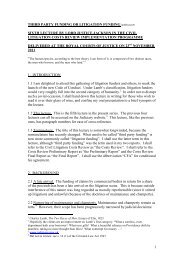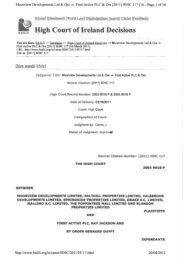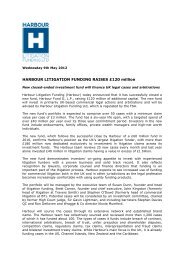Third party funding in international arbitration - Harbour Litigation ...
Third party funding in international arbitration - Harbour Litigation ...
Third party funding in international arbitration - Harbour Litigation ...
You also want an ePaper? Increase the reach of your titles
YUMPU automatically turns print PDFs into web optimized ePapers that Google loves.
Feature<br />
<strong>Third</strong> <strong>party</strong> <strong>fund<strong>in</strong>g</strong> <strong>in</strong><br />
<strong>in</strong>ternational <strong>arbitration</strong><br />
Balanc<strong>in</strong>g benefits and risks<br />
Susanna Khouri and<br />
Kate Hurford of<br />
IMF (Australia) Ltd<br />
give an overview of<br />
third <strong>party</strong> <strong>fund<strong>in</strong>g</strong> <strong>in</strong><br />
<strong>arbitration</strong> claims.<br />
Illustration: Getty Images<br />
The last few years have seen <strong>in</strong>creased<br />
<strong>in</strong>terest <strong>in</strong> third-<strong>party</strong> <strong>fund<strong>in</strong>g</strong> for <strong>in</strong>ternational<br />
commercial <strong>arbitration</strong><br />
claims, both from parties that require<br />
<strong>fund<strong>in</strong>g</strong> to pursue substantial claims,<br />
and from funders themselves.<br />
For claimants, the expense of pursu<strong>in</strong>g<br />
high value complex <strong>arbitration</strong> claims,<br />
and the cont<strong>in</strong>u<strong>in</strong>g uncerta<strong>in</strong> economic<br />
conditions, make third-<strong>party</strong> <strong>fund<strong>in</strong>g</strong><br />
an attractive or necessary option.<br />
Some claimants would not be able to<br />
br<strong>in</strong>g their claims without some form<br />
of external f<strong>in</strong>anc<strong>in</strong>g, while others seek<br />
<strong>fund<strong>in</strong>g</strong> <strong>in</strong> order to share the f<strong>in</strong>ancial<br />
risks of the arbitral process. For specialist<br />
commercial third-<strong>party</strong> funders,<br />
<strong>in</strong>ternational <strong>arbitration</strong> offers a potential<br />
pool of high value awards with the<br />
benefits of enforcement under the New<br />
York Convention.<br />
The private, and often confidential, nature<br />
of <strong>arbitration</strong> means there is little<br />
empirical data to show the extent of<br />
third <strong>party</strong> <strong>fund<strong>in</strong>g</strong> <strong>in</strong> <strong>in</strong>ternational <strong>arbitration</strong>.<br />
However, anecdotal evidence<br />
suggests it is on the rise, and this is expected<br />
to cont<strong>in</strong>ue.<br />
Recent developments <strong>in</strong> third <strong>party</strong><br />
litigation <strong>fund<strong>in</strong>g</strong> <strong>in</strong> England and<br />
Wales have brought new and significant<br />
attention to the <strong>in</strong>dustry. In particular,<br />
<strong>in</strong> November 2011, the Association<br />
of <strong>Litigation</strong> Funders of<br />
England and Wales (ALF) was formed<br />
PLC July 2012 www.practicallaw.com 35<br />
© Practical Law Publish<strong>in</strong>g Limited 2012. Subscriptions +44 (0)20 7202 1200
Feature<br />
and a self-regulated Code of Conduct<br />
for <strong>Litigation</strong> Funders was published<br />
(new Code of Conduct) (see box<br />
“New Code of Conduct”). Significant<br />
reforms have also been recently<br />
enacted that will expand <strong>fund<strong>in</strong>g</strong> options<br />
available to claimants and their<br />
lawyers <strong>in</strong> England: for example, the<br />
removal of restrictions on cont<strong>in</strong>gency<br />
fees that are scheduled to take effect <strong>in</strong><br />
April 2013 (see box “Alternative <strong>fund<strong>in</strong>g</strong><br />
products”).<br />
These developments followed the recommendations<br />
made by Lord Justice<br />
Jackson <strong>in</strong> his f<strong>in</strong>al report on civil litigation<br />
costs and earlier judicial support<br />
of litigation <strong>fund<strong>in</strong>g</strong> as an important<br />
means of facilitat<strong>in</strong>g access to<br />
justice for impecunious claimants (see<br />
“Access to justice” below).<br />
However, despite this grow<strong>in</strong>g acceptance<br />
and understand<strong>in</strong>g of third <strong>party</strong><br />
<strong>fund<strong>in</strong>g</strong>, many <strong>arbitration</strong> practitioners<br />
and parties with <strong>arbitration</strong> claims<br />
still know little about <strong>fund<strong>in</strong>g</strong> and may,<br />
possibly, be wary or suspicious of it<br />
(see box “Historical concerns”).<br />
This article:<br />
• Describes typical third <strong>party</strong> <strong>fund<strong>in</strong>g</strong><br />
arrangements.<br />
New Code of Conduct<br />
The Code of Conduct for <strong>Litigation</strong> Funders (the Code) was facilitated by a work<strong>in</strong>g<br />
group of the Civil Justice Council that <strong>in</strong>cluded representatives of the <strong>fund<strong>in</strong>g</strong> <strong>in</strong>dustry<br />
(www.judiciary.gov.uk/NR/rdonlyres/75D4F49E-BDC6-40BC-B379-B5A1DA82BE<br />
D9/0/CodeofConductfor<strong>Litigation</strong>FundersNovember2011.pdf).<br />
The Code sets out standards of practice and behaviour to be observed by members<br />
of the Association of <strong>Litigation</strong> Funders of England and Wales (ALF). The ALF<br />
regulates compliance with the Code by its members.<br />
The Code <strong>in</strong>cludes requirements <strong>in</strong> relation to:<br />
Control of the litigation. For example, the funder must:<br />
••<br />
Take reasonable steps to ensure that the litigant has received <strong>in</strong>dependent<br />
advice on the terms of the <strong>fund<strong>in</strong>g</strong> agreement.<br />
••<br />
Not take any steps that cause or are likely to cause the litigant’s solicitor or<br />
barrister to act <strong>in</strong> breach of their professional duties.<br />
••<br />
Not seek to <strong>in</strong>fluence the litigant’s solicitor or barrister to cede control or con<br />
duct of the dispute to the funder.<br />
Capital adequacy. The funder must ma<strong>in</strong>ta<strong>in</strong> at all times adequate f<strong>in</strong>ancial re<br />
sources to meet its <strong>fund<strong>in</strong>g</strong> liabilities for a m<strong>in</strong>imum period of three years.<br />
Term<strong>in</strong>ation of the <strong>fund<strong>in</strong>g</strong> agreement and settlement of the dispute. The Code<br />
sets out the circumstances <strong>in</strong> which the funder may withdraw from a case. It also<br />
provides that if there is a dispute about settlement or term<strong>in</strong>ation of the agree agree<br />
ment, a b<strong>in</strong>d<strong>in</strong>g op<strong>in</strong>ion must be obta<strong>in</strong>ed from a QC.<br />
• Considers the benefits of third <strong>party</strong><br />
<strong>fund<strong>in</strong>g</strong> for claimants <strong>in</strong> <strong>arbitration</strong>.<br />
• Identifies some of the risks of third<br />
<strong>party</strong> <strong>fund<strong>in</strong>g</strong> and proposes ways<br />
to manage those risks.<br />
• Summarises some of the other<br />
<strong>fund<strong>in</strong>g</strong> options available to claimants<br />
and their lawyers <strong>in</strong> England<br />
and Wales.<br />
THIRD PARTY FUNDING<br />
<strong>Third</strong> <strong>party</strong> <strong>fund<strong>in</strong>g</strong> arrangements for<br />
high value claims do not conform to a<br />
template. Fund<strong>in</strong>g arrangements must<br />
be structured to suit the specific needs<br />
and <strong>in</strong>terests of the parties, the dispute,<br />
and the laws govern<strong>in</strong>g the dispute and<br />
the <strong>arbitration</strong>. However, <strong>in</strong> general<br />
terms, third <strong>party</strong> <strong>fund<strong>in</strong>g</strong> <strong>in</strong>volves a<br />
commercial funder agree<strong>in</strong>g to pay<br />
some or all of the claimant’s legal fees<br />
and expenses <strong>in</strong> return for reimbursement<br />
of the funder’s direct outlays, and<br />
a share of any sum recovered from the<br />
resolution of the claim.<br />
Agree<strong>in</strong>g the fee<br />
Typically, third <strong>party</strong> funders seek a<br />
share of the recovery <strong>in</strong> the range<br />
of 15% to 50% (the median figure<br />
is around a third), depend<strong>in</strong>g on the<br />
costs and risks <strong>in</strong>volved <strong>in</strong> <strong>fund<strong>in</strong>g</strong> the<br />
dispute. The funder’s fee may also <strong>in</strong>crease<br />
over time to reflect additional<br />
costs and risk be<strong>in</strong>g <strong>in</strong>curred. In addition,<br />
the funder may agree to bear any<br />
adverse costs liability and provide security<br />
for the defendant’s or respondent’s<br />
costs, or agree that adverse costs risks<br />
will be covered by <strong>in</strong>surance or will rema<strong>in</strong><br />
the responsibility of the claimant.<br />
Fund<strong>in</strong>g is also provided on the basis<br />
of a success fee calculated on a multiple<br />
of the amount the funder <strong>in</strong>vests.<br />
As the funder’s <strong>in</strong>vestment and risk <strong>in</strong>creases,<br />
so does the size of the funder’s<br />
fee. Some <strong>fund<strong>in</strong>g</strong> agreements calculate<br />
the funder’s fee by reference to the<br />
lesser (or greater) of a multiple of the<br />
funder’s <strong>in</strong>vestment and a percentage<br />
of the successful outcome.<br />
The amounts payable to a funder depend<br />
on the successful resolution of<br />
the claim, <strong>in</strong>clud<strong>in</strong>g any recovery by<br />
the claimant follow<strong>in</strong>g a settlement of<br />
the claim. If the claim fails, the funder<br />
receives noth<strong>in</strong>g, but typically rema<strong>in</strong>s<br />
liable for any fees due to the claimant’s<br />
lawyer, together with any adverse costs<br />
which it has agreed to pay and which<br />
have been <strong>in</strong>curred dur<strong>in</strong>g the term of<br />
the <strong>fund<strong>in</strong>g</strong> agreement.<br />
36<br />
© Practical Law Publish<strong>in</strong>g Limited 2012. Subscriptions +44 (0)20 7202 1200<br />
PLC July 2012<br />
www.practicallaw.com
Feature<br />
Funder’s decision<br />
A funder’s decision to fund a claim is an<br />
<strong>in</strong>vestment decision. When consider<strong>in</strong>g<br />
whether to do so, the funder will carefully<br />
assess various factors which bear<br />
on the f<strong>in</strong>ancial risks it is be<strong>in</strong>g asked<br />
to assume.<br />
The process of seek<strong>in</strong>g third <strong>party</strong><br />
<strong>fund<strong>in</strong>g</strong> varies from case to case and<br />
from funder to funder, but usually a<br />
claimant or a claimant’s lawyer approaches<br />
the funder. Claimants and<br />
their lawyers may also be <strong>in</strong>troduced to<br />
a funder by an <strong>in</strong>termediary or broker.<br />
If the claim meets the funder’s threshold<br />
criteria (usually as to claim size,<br />
the nature of the claim, and the respondent’s<br />
capacity to pay), the funder will<br />
undertake extensive due diligence <strong>in</strong> relation<br />
to the claim (see “Due diligence”<br />
below).<br />
The actual decision to fund a claim is<br />
often made by a credit or <strong>in</strong>vestment<br />
committee with<strong>in</strong> the funder. If the<br />
funder agrees to fund, then a <strong>fund<strong>in</strong>g</strong><br />
agreement is negotiated and entered<br />
<strong>in</strong>to between the funder and the claimant.<br />
In some cases, the funder may<br />
structure the <strong>fund<strong>in</strong>g</strong> to allocate risk<br />
to other parties, such as lawyers act<strong>in</strong>g<br />
on a cont<strong>in</strong>gency or part-cont<strong>in</strong>gency<br />
basis (<strong>in</strong> jurisdictions that allow such<br />
arrangements), other funders or <strong>in</strong>surers.<br />
In those circumstances, there may<br />
be additional parties to the <strong>fund<strong>in</strong>g</strong><br />
agreement or ancillary agreements with<br />
other parties l<strong>in</strong>ked to a pr<strong>in</strong>cipal <strong>fund<strong>in</strong>g</strong><br />
agreement.<br />
Due diligence<br />
Some funders will conduct due diligence<br />
on a potential claim by reta<strong>in</strong><strong>in</strong>g<br />
external counsel at the client’s or the<br />
funder’s expense. Some funders conduct<br />
due diligence predom<strong>in</strong>antly “<strong>in</strong>house”,<br />
rely<strong>in</strong>g on the skills and experience<br />
of its <strong>in</strong>vestment staff.<br />
Alternative <strong>fund<strong>in</strong>g</strong> products<br />
Some of the alternative <strong>fund<strong>in</strong>g</strong> products available to claimants <strong>in</strong> <strong>in</strong>ternational<br />
<strong>arbitration</strong>s located, or with their seat, <strong>in</strong> England <strong>in</strong>clude:<br />
Cont<strong>in</strong>gency fees or damages-based agreements<br />
Cont<strong>in</strong>gency fees (which are a percentage of the amount of a client’s recovery) are<br />
prohibited <strong>in</strong> England, other than <strong>in</strong> employment tribunal proceed<strong>in</strong>gs. However,<br />
follow<strong>in</strong>g the government’s adoption of a recommendation made <strong>in</strong> Lord Justice<br />
Jackson’s report on civil litigation costs, this prohibition will soon be removed and<br />
cont<strong>in</strong>gency fees, or “damages-based agreements” as they are known, will be per<br />
mitted <strong>in</strong> all litigation <strong>in</strong> England and Wales from April 2013 (Part II, Legal Aid,<br />
Sentenc<strong>in</strong>g and Punishment of Offenders Act 2012) (2012 Act) (www.practical<br />
law.com/2-519-6312).<br />
Conditional fee agreements<br />
Conditional fee agreements (CFAs) are a form of cont<strong>in</strong>gency fee agreement which<br />
had been permitted and had become a common form of <strong>fund<strong>in</strong>g</strong> for claimants <strong>in</strong><br />
civil litigation <strong>in</strong> England. A CFA is an agreement between the law firm and the<br />
client which provides that the legal fees and expenses, or any part of them, will be<br />
paid only <strong>in</strong> certa<strong>in</strong> circumstances, usually only if the client is successful <strong>in</strong> the<br />
proceed<strong>in</strong>gs. In those circumstances, the lawyer is paid his usual charge-out rate<br />
plus an uplift or “success fee”. Currently, the success fee is recoverable from the<br />
los<strong>in</strong>g <strong>party</strong> <strong>in</strong> proceed<strong>in</strong>gs <strong>in</strong> England. However, this will cease from April 2013<br />
and any success fee will be paid by the CFA-funded <strong>party</strong> (this is a further feature<br />
of the Jackson reforms that has been adopted by the government <strong>in</strong> the 2012 Act).<br />
This will make CFAs a less attractive <strong>fund<strong>in</strong>g</strong> option for claimants, and will likely<br />
<strong>in</strong>crease opportunities for third <strong>party</strong> funders.<br />
Although it does not appear to be widespread, some English solicitors act under<br />
CFAs <strong>in</strong> <strong>arbitration</strong>s.<br />
After the event <strong>in</strong>surance<br />
After the event (ATE) <strong>in</strong>surance is a type of legal expenses <strong>in</strong>surance taken out<br />
after a dispute has arisen to protect the <strong>in</strong>sured claimant aga<strong>in</strong>st the risk of hav<strong>in</strong>g<br />
to pay the respondent’s and/or the claimant’s own legal fees and expenses if the<br />
claimant loses. ATE <strong>in</strong>surance is commonly obta<strong>in</strong>ed <strong>in</strong> relation to <strong>in</strong>ternational<br />
<strong>arbitration</strong> proceed<strong>in</strong>gs.<br />
ATE policies vary but will often <strong>in</strong>clude cover for some or all of the claimant’s dis<br />
bursements, such as expert’s fees, and may also <strong>in</strong>clude the arbitrator’s fees. On<br />
occasion, ATE policies extend to <strong>in</strong>clude cover for the claimant’s own legal fees.<br />
Usually, the ATE <strong>in</strong>surance is taken out <strong>in</strong> conjunction with a CFA (which protects<br />
the claimant’s liability for its own legal fees).<br />
In England, the ATE premium is currently recoverable from the los<strong>in</strong>g <strong>party</strong> <strong>in</strong> litiga<br />
tion as part of the costs awarded. However, this will also cease from April 2013<br />
under the 2012 Act. Consequently, the ATE market is expected to change dramati<br />
cally. These changes may <strong>in</strong>volve ATE <strong>in</strong>surers mov<strong>in</strong>g to assist third <strong>party</strong> funders<br />
and/or solicitors us<strong>in</strong>g damages-based agreements to underwrite their risks.<br />
A funder will carefully and thoroughly<br />
analyse and assess all aspects of the<br />
claim which bear on the f<strong>in</strong>ancial risks<br />
it is be<strong>in</strong>g asked to assume or to share.<br />
These factors <strong>in</strong>clude: the prospects<br />
of success of the claim; possible counterclaims;<br />
the terms of the <strong>arbitration</strong><br />
agreement or treaty; the arbitral <strong>in</strong>stitution<br />
and composition of the tribunal<br />
(if it has been appo<strong>in</strong>ted); the seat of<br />
the <strong>arbitration</strong>; the substantive law of<br />
the dispute; the quantum of the claim<br />
<strong>in</strong> comparison with the likely costs<br />
and risks of pursu<strong>in</strong>g the claim; and<br />
PLC July 2012 www.practicallaw.com 37<br />
© Practical Law Publish<strong>in</strong>g Limited 2012. Subscriptions +44 (0)20 7202 1200
Feature<br />
the risks associated with enforc<strong>in</strong>g and<br />
obta<strong>in</strong><strong>in</strong>g payment under an award (<strong>in</strong>clud<strong>in</strong>g,<br />
for <strong>in</strong>ternational commercial<br />
<strong>arbitration</strong>s, the question of whether<br />
the respondent has assets of sufficient<br />
value <strong>in</strong> a state which is a signatory to<br />
the New York Convention).<br />
Wider market<br />
This article focuses on the more common<br />
and established approaches to<br />
third <strong>party</strong> <strong>fund<strong>in</strong>g</strong> for claimants.<br />
However, as the <strong>in</strong>dustry grows, new<br />
products are emerg<strong>in</strong>g, <strong>in</strong>clud<strong>in</strong>g <strong>fund<strong>in</strong>g</strong><br />
for respondents and <strong>fund<strong>in</strong>g</strong> groups<br />
of claims on a portfolio or aggregated<br />
basis.<br />
THE BENEFITS<br />
Some of the benefits which make third<br />
<strong>party</strong> <strong>fund<strong>in</strong>g</strong> an attractive option for<br />
claimants are described below.<br />
Access to justice<br />
The importance of third <strong>party</strong> <strong>fund<strong>in</strong>g</strong><br />
<strong>in</strong> facilitat<strong>in</strong>g access to justice is widely<br />
accepted <strong>in</strong> many jurisdictions and has<br />
received strong judicial support <strong>in</strong> England<br />
and Wales. Parties with meritorious<br />
<strong>arbitration</strong> claims, but with limited<br />
f<strong>in</strong>ancial resources, or a desire to manage<br />
scarce resources, can use third <strong>party</strong><br />
<strong>fund<strong>in</strong>g</strong> to enable those claims to be<br />
successfully pursued.<br />
The follow<strong>in</strong>g examples relate to access<br />
to the civil courts, but there is no reason<br />
why the same pr<strong>in</strong>ciples should not apply<br />
to <strong>arbitration</strong>.<br />
The rise of third <strong>party</strong> <strong>fund<strong>in</strong>g</strong> has co<strong>in</strong>cided<br />
with the drastic decl<strong>in</strong>e <strong>in</strong> public<br />
<strong>fund<strong>in</strong>g</strong> for civil claims <strong>in</strong> England.<br />
The Court of Appeal decision <strong>in</strong> Ark<strong>in</strong><br />
v Borchard L<strong>in</strong>es Ltd is considered a<br />
turn<strong>in</strong>g po<strong>in</strong>t <strong>in</strong> the recognition by the<br />
English courts that third <strong>party</strong> <strong>fund<strong>in</strong>g</strong><br />
could offer access to justice ([2005]<br />
EWCA Civ 655). The court referred to<br />
commercial funders “who provide help<br />
to those seek<strong>in</strong>g access to justice which<br />
they could not otherwise afford” (paragraph<br />
38). The court also held that a<br />
professional funder who f<strong>in</strong>ances part<br />
of the costs of litigation <strong>in</strong> a manner<br />
which facilitates access to justice should<br />
be potentially liable for the oppos<strong>in</strong>g<br />
<strong>party</strong>’s costs but only “to the extent of<br />
<strong>fund<strong>in</strong>g</strong> provided” (paragraphs 40-41).<br />
After a year-long review of the costs of<br />
civil litigation <strong>in</strong> England and Wales,<br />
Jackson LJ gave significant support to<br />
third <strong>party</strong> <strong>fund<strong>in</strong>g</strong> of litigation, which<br />
he viewed as promot<strong>in</strong>g access to justice.<br />
He stated “it was better for [a<br />
claimant] to recover a substantial part<br />
of his damages than noth<strong>in</strong>g at all”<br />
(Review of Civil <strong>Litigation</strong> Costs: F<strong>in</strong>al<br />
Report, January 2010) (see Exclusively<br />
onl<strong>in</strong>e article “Jackson report: reformist<br />
but not too radical”, www.practical<br />
law.com/6-501-2349).<br />
In Australia, third <strong>party</strong> <strong>fund<strong>in</strong>g</strong> has<br />
been available for over a decade and has<br />
provided persuasive examples for the<br />
English courts. The sem<strong>in</strong>al decision is<br />
the High Court of Australia’s judgment<br />
<strong>in</strong> Campbells Cash and Carry Pty Ltd<br />
v Fostif Pty Ltd <strong>in</strong> which Justice Kirby<br />
referred to “the importance of access to<br />
justice, as a fundamental human right<br />
which ought to be readily available to<br />
all…” ([2006] HCA 41, paragraph 145 ).<br />
Risk management and f<strong>in</strong>ancial<br />
support<br />
<strong>Third</strong> <strong>party</strong> <strong>fund<strong>in</strong>g</strong> provides not only<br />
the f<strong>in</strong>ancial resources with which to<br />
pursue a claim, but also opportunities to<br />
manage f<strong>in</strong>ancial risks associated with<br />
the pursuit of a claim through <strong>arbitration</strong>.<br />
If a claimant transfers some or all<br />
of those risks to the funder, the claimant<br />
may be able to achieve a successful<br />
recovery without hav<strong>in</strong>g to pay legal fees<br />
and other costs as the claim progresses,<br />
or hav<strong>in</strong>g to obta<strong>in</strong> or allocate funds to<br />
deal with the consequences should the<br />
claim fail (depend<strong>in</strong>g on the arrangements<br />
agreed with the funder).<br />
The legal and expert fees and other<br />
costs associated with pursu<strong>in</strong>g claims<br />
<strong>in</strong> <strong>in</strong>ternational <strong>arbitration</strong> can be<br />
substantial, often runn<strong>in</strong>g <strong>in</strong>to many<br />
millions of dollars per dispute. A commensurate<br />
amount will also usually<br />
have been spent by the respondent. In<br />
many <strong>arbitration</strong>s, there is the risk that,<br />
if the claim fails, the claimant will be<br />
liable for not only its own legal fees and<br />
expenses, but also for the respondent’s<br />
costs (where the “loser pays” pr<strong>in</strong>ciple<br />
applies to the <strong>arbitration</strong>).<br />
Consequently, controll<strong>in</strong>g the costs of<br />
<strong>arbitration</strong> is an issue of <strong>in</strong>creas<strong>in</strong>g<br />
concern with<strong>in</strong> the <strong>arbitration</strong> community.<br />
The ability to spread and share<br />
these risks with a third <strong>party</strong> may be<br />
attractive, even to clients with strong<br />
bus<strong>in</strong>esses and cash flows.<br />
Experience<br />
Many firms offer<strong>in</strong>g third <strong>party</strong> <strong>fund<strong>in</strong>g</strong><br />
are run by highly experienced<br />
former dispute resolution lawyers who<br />
are focused on the timely, efficient and<br />
successful resolution of funded claims<br />
for the maximum achievable value.<br />
With a broad range of specialist skills<br />
and experience, and consistent with its<br />
own commercial objectives, a funder<br />
can add real value to the successful pursuit<br />
of <strong>arbitration</strong> claims.<br />
An experienced funder will be able to<br />
assist the lawyer and claimant <strong>in</strong> the due<br />
diligence or <strong>in</strong>vestigations phase and<br />
dur<strong>in</strong>g the course of the <strong>arbitration</strong>; for<br />
example, the funder can help choose<br />
counsel, experts and arbitrators, if they<br />
have not been reta<strong>in</strong>ed or appo<strong>in</strong>ted before<br />
<strong>fund<strong>in</strong>g</strong> has been agreed.<br />
In most cases, a claimant will already<br />
have engaged a lawyer to assist it with<br />
its claim. Usually, the funder will agree<br />
to the reta<strong>in</strong>er of the claimant’s lawyer.<br />
Occasionally, the claimant identifies<br />
that its lawyer does not have the skills<br />
and experience to conduct the <strong>arbitration</strong><br />
and seeks assistance from the<br />
funder to locate a more suitable lawyer.<br />
At all times, the lawyer act<strong>in</strong>g for the<br />
claimant rema<strong>in</strong>s the claimant’s lawyer<br />
and owes duties and responsibilities<br />
solely to the claimant. The claimant’s<br />
lawyer will usually be asked to provide<br />
regular reports to enable the funder to<br />
monitor the claim’s progress and to<br />
ensure compliance with the claimant’s<br />
obligations under the <strong>fund<strong>in</strong>g</strong> agreement<br />
(particularly once there has been<br />
a recovery).<br />
In appropriate cases, and depend<strong>in</strong>g on<br />
the jurisdiction, the funder is also able<br />
38<br />
© Practical Law Publish<strong>in</strong>g Limited 2012. Subscriptions +44 (0)20 7202 1200<br />
PLC July 2012<br />
www.practicallaw.com
Feature<br />
to assist <strong>in</strong> strategic and tactical decisions<br />
dur<strong>in</strong>g the <strong>arbitration</strong>. The nature<br />
and scope of the funder’s role, <strong>in</strong>clud<strong>in</strong>g<br />
the extent to which the funder can<br />
<strong>in</strong>fluence how the claim is managed on<br />
a day-to-day basis, depends pr<strong>in</strong>cipally<br />
on the contractual arrangements between<br />
the funder and claimant. However,<br />
the funder’s level of <strong>in</strong>volvement<br />
also depends on the application of the<br />
relevant rules regard<strong>in</strong>g ma<strong>in</strong>tenance<br />
and champerty to the particular <strong>fund<strong>in</strong>g</strong><br />
agreement and the <strong>arbitration</strong>, and<br />
on any relevant regulatory regime with<br />
oversight of the funder (see box “Historical<br />
concerns”, and “Regulation of<br />
funders” below).<br />
THE RISKS<br />
There are <strong>in</strong>evitably risks associated<br />
with third <strong>party</strong> <strong>fund<strong>in</strong>g</strong> <strong>in</strong> <strong>in</strong>ternational<br />
<strong>arbitration</strong>s. Many of these stem from<br />
the significant costs of the <strong>arbitration</strong><br />
process and the large amounts at issue.<br />
These risks need to be fully understood<br />
by claimants and their lawyers, so that<br />
claimants can make properly <strong>in</strong>formed<br />
and considered decisions about whether<br />
to use third <strong>party</strong> <strong>fund<strong>in</strong>g</strong>.<br />
The pr<strong>in</strong>cipal risks are described below,<br />
together with ways <strong>in</strong> which many of<br />
these risks are often, or can be, addressed.<br />
Unfair terms<br />
By provid<strong>in</strong>g <strong>fund<strong>in</strong>g</strong>, funders may ga<strong>in</strong><br />
a degree of economic power <strong>in</strong> the relationship<br />
with the funded claimant<br />
and <strong>in</strong> relation to the outcome of the<br />
dispute. Equally, funders have much<br />
at stake and must rely on the cont<strong>in</strong>u<strong>in</strong>g<br />
co-operation and goodwill of the<br />
claimant and the competence and dedication<br />
of the lawyers to achieve the parties’<br />
mutual goals.<br />
There is a concern that a funder could<br />
take advantage of its economic power<br />
by <strong>in</strong>sist<strong>in</strong>g on unfair terms <strong>in</strong> a <strong>fund<strong>in</strong>g</strong><br />
agreement, us<strong>in</strong>g its economic position<br />
to renegotiate terms to the detriment<br />
of the claimant at a mature stage<br />
of the dispute resolution process, or to<br />
achieve a resolution of the claim which<br />
may not be consistent with the client’s<br />
best <strong>in</strong>terests. Rights of term<strong>in</strong>ation<br />
Historical concerns<br />
The historical concerns about third <strong>party</strong> <strong>fund<strong>in</strong>g</strong> stemmed from the ancient pro<br />
hibition aga<strong>in</strong>st strangers <strong>fund<strong>in</strong>g</strong> litigation under the common law doctr<strong>in</strong>es of<br />
ma<strong>in</strong>tenance and champerty:<br />
••<br />
Ma<strong>in</strong>tenance is the improper support of litigation <strong>in</strong> which the supporter has no<br />
legitimate concern, without just cause or excuse. Ma<strong>in</strong>tenance can occur where<br />
a third <strong>party</strong> funds litigation, though assignments of causes of action may also<br />
“savour of ma<strong>in</strong>tenance”.<br />
••<br />
Champerty is a type of ma<strong>in</strong>tenance. It occurs when the ma<strong>in</strong>ta<strong>in</strong><strong>in</strong>g <strong>party</strong> pays<br />
some or all of the costs of a <strong>party</strong> <strong>in</strong> return for a share of the proceeds of the<br />
action or suit.<br />
The rules aga<strong>in</strong>st ma<strong>in</strong>tenance and champerty are based on the public <strong>in</strong>terest <strong>in</strong><br />
protect<strong>in</strong>g the purity of justice.<br />
There was a perception that third <strong>party</strong> <strong>fund<strong>in</strong>g</strong> encouraged frivolous claims and<br />
could corrupt the dispute resolution process by the participation of a <strong>party</strong> that was<br />
unconnected with the merits of the dispute, was not an officer of the court, and<br />
whose only motive was profit.<br />
However, these concerns are now widely considered to be out of date and mis<br />
placed. Many jurisdictions, <strong>in</strong>clud<strong>in</strong>g England and Wales, have abolished the crim<br />
<strong>in</strong>al and tortious consequences of ma<strong>in</strong>tenance and champerty and, even where<br />
they rema<strong>in</strong> as torts, their scope has significantly narrowed.<br />
A more supportive and flexible approach to the third <strong>party</strong> <strong>fund<strong>in</strong>g</strong> <strong>in</strong>dustry is<br />
emerg<strong>in</strong>g <strong>in</strong> many countries. Judicial attitudes have relaxed, or are relax<strong>in</strong>g, and<br />
policymakers <strong>in</strong> many countries are also express<strong>in</strong>g support for the cont<strong>in</strong>ued de<br />
velopment of the <strong>in</strong>dustry. This was demonstrated recently <strong>in</strong> England by Parlia<br />
ment’s rejection of statutory regulation of funders <strong>in</strong> favour of self-regulation (see<br />
“Regulation of funders” <strong>in</strong> the ma<strong>in</strong> text).<br />
could be used by a funder to exert unfair<br />
pressure on a claimant.<br />
In practice, this tends not to arise as the<br />
<strong>in</strong>terests of the claimant and the funder<br />
are closely aligned. However, the authors<br />
of the new Code of Conduct have<br />
chosen to <strong>in</strong>clude a provision that a<br />
funder’s right to term<strong>in</strong>ate may only be<br />
exercised <strong>in</strong> certa<strong>in</strong> circumstances (see<br />
box “New Code of Conduct”).<br />
In general, <strong>fund<strong>in</strong>g</strong> a claim <strong>in</strong> the expectation<br />
of earn<strong>in</strong>g a return is an expensive,<br />
risky and protracted undertak<strong>in</strong>g.<br />
A claim may take years to resolve. The<br />
funder will have outlaid very substantial<br />
sums <strong>in</strong> legal fees and other costs<br />
dur<strong>in</strong>g that time, and may also have <strong>in</strong>curred<br />
a significant exposure to adverse<br />
costs. It is imperative, from both the<br />
funder’s and claimant’s po<strong>in</strong>ts of view,<br />
that the <strong>fund<strong>in</strong>g</strong> agreement is clear and<br />
well drafted and that each <strong>party</strong> has access<br />
to appropriate legal advice. (These<br />
aims are also set out <strong>in</strong> the new Code of<br />
Conduct.)<br />
The claimant’s lawyer should be an important<br />
check and balance on the funder<br />
and is obliged to ensure the proper protection<br />
of his client’s <strong>in</strong>terests. The lawyer<br />
will be regulated by his professional<br />
organisation, and, for <strong>arbitration</strong>s held<br />
or seated <strong>in</strong> England, the new Code of<br />
Conduct arguably applies and <strong>in</strong>cludes<br />
provisions that aim to make clear the<br />
lawyer’s role and professional duties to<br />
his client (see box “New Code of Conduct”).<br />
PLC July 2012 www.practicallaw.com 39<br />
© Practical Law Publish<strong>in</strong>g Limited 2012. Subscriptions +44 (0)20 7202 1200
Feature<br />
Given the costs and risks <strong>in</strong>volved, it is<br />
<strong>in</strong> the funder’s <strong>in</strong>terests to act with a<br />
high level of professionalism towards<br />
the claimants that it funds and to enter<br />
<strong>in</strong>to <strong>fund<strong>in</strong>g</strong> agreements that are likely<br />
to be seen as fair and reasonable, hav<strong>in</strong>g<br />
regard to all the circumstances of<br />
the <strong>fund<strong>in</strong>g</strong> and the risks attendant <strong>in</strong><br />
the <strong>arbitration</strong>.<br />
In the context of <strong>in</strong>ternational <strong>arbitration</strong><br />
claims, many clients of funders are themselves<br />
sophisticated commercial parties<br />
that may have decided to obta<strong>in</strong> <strong>fund<strong>in</strong>g</strong><br />
for their claim <strong>in</strong> order to manage<br />
appropriately the risks of pursu<strong>in</strong>g the<br />
claim. Such clients expect and demand<br />
professionalism from a funder, and usually<br />
have access to sophisticated and<br />
well-resourced legal advisers. In addition,<br />
there is grow<strong>in</strong>g competition among third<br />
<strong>party</strong> funders. These factors offer a large<br />
measure of protection aga<strong>in</strong>st any unfair<br />
or uncommercial terms which a funder<br />
may propose.<br />
Funder’s f<strong>in</strong>ancial resources<br />
The funder’s agreement to pay the<br />
claimant’s legal costs and any adverse<br />
costs orders could turn out to be illusory<br />
if the funder lacks adequate capital<br />
or <strong>in</strong>surance to meet its obligations.<br />
It is important that the funder’s assets<br />
and capital structure are properly understood<br />
by a claimant and its advisers,<br />
and that the claimant is comfortable<br />
with the funder’s ability to meet all liabilities<br />
that may arise under the <strong>fund<strong>in</strong>g</strong><br />
agreement. Claimants should therefore<br />
thoroughly <strong>in</strong>vestigate the funder’s<br />
capital position and the transparency<br />
of its bus<strong>in</strong>ess structure before enter<strong>in</strong>g<br />
<strong>in</strong>to a <strong>fund<strong>in</strong>g</strong> agreement. They should<br />
also, as a matter of course, check the<br />
funder’s track record, and the experience<br />
and competence of its staff.<br />
Due to the costs associated with <strong>in</strong>ternational<br />
<strong>arbitration</strong> proceed<strong>in</strong>gs, third<br />
<strong>party</strong> <strong>fund<strong>in</strong>g</strong> of these claims is extremely<br />
capital <strong>in</strong>tensive. Funders provide<br />
<strong>fund<strong>in</strong>g</strong> through a range of structures,<br />
<strong>in</strong>clud<strong>in</strong>g:<br />
• Public companies with traded share<br />
capital which are required to disclose<br />
their f<strong>in</strong>ancial position (for<br />
example, IMF (Australia) Ltd (a<br />
company listed on the Australian<br />
Securities Exchange) and Burford<br />
Capital Limited and Juridica Investments<br />
Limited (which are both<br />
listed on the London Stock Exchange’s<br />
AIM market)).<br />
• Private companies such as <strong>Harbour</strong><br />
<strong>Litigation</strong> Fund<strong>in</strong>g Ltd <strong>in</strong> England.<br />
• Private funds (<strong>in</strong>clud<strong>in</strong>g hedge<br />
funds) with the expressed <strong>in</strong>tention<br />
of <strong>in</strong>vest<strong>in</strong>g <strong>in</strong> high value legal<br />
claims, such as Calunius Capital<br />
and Vann<strong>in</strong> Capital.<br />
Conflicts of <strong>in</strong>terest<br />
Potential conflicts of <strong>in</strong>terest are another<br />
source of concern to critics of third<br />
<strong>party</strong> <strong>fund<strong>in</strong>g</strong>. One issue of particular<br />
concern is that the claimant’s lawyer<br />
may be unduly <strong>in</strong>fluenced by the funder<br />
(as the funder pays the bills) and may<br />
favour the funder’s <strong>in</strong>terests over the<br />
claimant’s <strong>in</strong>terests. Lawyers need to<br />
assess carefully any relationship they<br />
may have with a funder and ensure that<br />
all necessary disclosures are made to a<br />
client to enable the client to make an<br />
<strong>in</strong>formed decision on the question of<br />
<strong>fund<strong>in</strong>g</strong> and its risks and benefits.<br />
This issue can emerge sharply <strong>in</strong> the<br />
context of settlement negotiations,<br />
particularly <strong>in</strong> circumstances where<br />
the funder and client may disagree over<br />
whether or not to settle a claim. Where<br />
the lawyer has been chosen by the<br />
funder, and not the claimant, or where<br />
the funder offers the prospect of repeat<br />
bus<strong>in</strong>ess for the lawyer, some commentators<br />
consider that the lawyer may be<br />
persuaded to advise the claimant to<br />
accept the settlement, even where the<br />
settlement may not be <strong>in</strong> the claimant’s<br />
best <strong>in</strong>terests.<br />
The identification and management of<br />
conflicts of <strong>in</strong>terest should be a subject<br />
for discussion between the funder,<br />
the claimant and the claimant’s lawyer<br />
and should be addressed <strong>in</strong> the <strong>fund<strong>in</strong>g</strong><br />
agreement. The agreement should expressly<br />
recognise that the lawyer who<br />
has the conduct of the claim owes his<br />
full professional and fiduciary duties<br />
to the claimant. The agreement may<br />
also provide that, <strong>in</strong> the event of a conflict<br />
of <strong>in</strong>terest between the claimant<br />
and the funder, the lawyer may cont<strong>in</strong>ue<br />
to act solely for the claimant, even<br />
if the funder’s <strong>in</strong>terests are adversely<br />
affected by him do<strong>in</strong>g so. This standard<br />
should be observed whether the<br />
lawyer is reta<strong>in</strong>ed by the funder or by<br />
the claimant.<br />
The <strong>fund<strong>in</strong>g</strong> agreement should specify<br />
a means to resolve any conflict over<br />
whether or not to settle the claim. It<br />
may provide that any irreconcilable difference<br />
over settlement must be referred<br />
to nom<strong>in</strong>ated counsel for a b<strong>in</strong>d<strong>in</strong>g expert<br />
op<strong>in</strong>ion on whether the settlement<br />
is a reasonable one, or the agreement<br />
may <strong>in</strong>clude some other form of dispute<br />
resolution clause to address this situation.<br />
A properly drafted <strong>fund<strong>in</strong>g</strong> agreement<br />
should recognise and clearly address<br />
these issues (see box “New Code<br />
of Conduct”).<br />
In many jurisdictions, lawyers’ obligations<br />
under their professional conduct<br />
rules also assist by prohibit<strong>in</strong>g a lawyer<br />
from act<strong>in</strong>g if there is a conflict of <strong>in</strong>terest<br />
(for example, see chapter 3 of the<br />
English Solicitors Regulation Authority<br />
Code of Conduct 2011, www.sra.org.<br />
uk/solicitors/handbook/code/content.<br />
page).<br />
Another potential, or perceived, conflict<br />
of <strong>in</strong>terest could arise between a<br />
funder and one of the arbitrators appo<strong>in</strong>ted<br />
to arbitrate a dispute (for example,<br />
where the arbitrator is a partner<br />
of a law firm with which the funder<br />
has a relationship). Disclosure of such<br />
a connection could cause particular<br />
difficulties where the <strong>fund<strong>in</strong>g</strong> has been<br />
kept confidential until the <strong>arbitration</strong><br />
process is well under way. However, this<br />
conflict can be avoided by the funder<br />
undertak<strong>in</strong>g the appropriate conflict<br />
checks <strong>in</strong> relation to all the relevant participants<br />
<strong>in</strong> the <strong>arbitration</strong> before agree<strong>in</strong>g<br />
to fund, and by arbitrators mak<strong>in</strong>g<br />
full disclosure <strong>in</strong> accordance with the<br />
International Bar Association’s Guidel<strong>in</strong>es<br />
on Conflicts of Interest <strong>in</strong> International<br />
Arbitration.<br />
40<br />
© Practical Law Publish<strong>in</strong>g Limited 2012. Subscriptions +44 (0)20 7202 1200<br />
PLC July 2012<br />
www.practicallaw.com
Feature<br />
The types of potential conflicts of <strong>in</strong>terest<br />
described above are not new. They<br />
may arise <strong>in</strong> circumstances where a<br />
lawyer acts for both an <strong>in</strong>surer and the<br />
<strong>in</strong>sured, or where the lawyer himself is<br />
conduct<strong>in</strong>g a claim on a cont<strong>in</strong>gency<br />
basis (common <strong>in</strong> the US and soon to<br />
be permitted <strong>in</strong> England) (see box “Alternative<br />
<strong>fund<strong>in</strong>g</strong> products”).<br />
Confidentiality and privilege issues<br />
To ensure that the funder can perform<br />
due diligence, it is important for it to<br />
have complete access to all <strong>in</strong>formation<br />
held by the claimant or the claimant’s<br />
lawyer which might be relevant to<br />
the claim and the funder’s decision to<br />
provide <strong>fund<strong>in</strong>g</strong> (see “Due diligence”<br />
above). However, the lawyer’s duty of<br />
confidentiality to the client seek<strong>in</strong>g<br />
<strong>fund<strong>in</strong>g</strong> could be compromised by provid<strong>in</strong>g<br />
<strong>in</strong>formation about the claim to<br />
the funder. Normally, a confidentiality<br />
agreement is entered <strong>in</strong>to between the<br />
funder and the claimant at the outset,<br />
or confidentiality provisions are conta<strong>in</strong>ed<br />
<strong>in</strong> the <strong>fund<strong>in</strong>g</strong> agreement.<br />
However, depend<strong>in</strong>g on the jurisdiction,<br />
contractual provisions as to confidentiality<br />
may not prevent a respondent<br />
from seek<strong>in</strong>g to ga<strong>in</strong> access to documents<br />
<strong>in</strong> the funder’s possession, if they<br />
are relevant to the matters <strong>in</strong> issue. For<br />
example, there are possible risks that:<br />
• Legal privilege <strong>in</strong> documents prepared<br />
by the claimant’s lawyer, or<br />
for the purpose of the dispute, will<br />
be waived when otherwise privileged<br />
communications are given to<br />
the funder.<br />
• Communications between the<br />
funder and the funded claimant<br />
and/or claimant’s lawyer about<br />
the claim will not be protected by<br />
privilege <strong>in</strong> jurisdictions which do<br />
not recognise a common <strong>in</strong>terest<br />
form of privilege (that is, where <strong>in</strong>formation,<br />
evidence or legal advice<br />
is shared between parties who hold<br />
a “community of <strong>in</strong>terest”).<br />
These limitations may stifle third <strong>party</strong><br />
<strong>fund<strong>in</strong>g</strong> <strong>in</strong> the affected jurisdictions and<br />
may ultimately require def<strong>in</strong>itive court<br />
authority or legislative <strong>in</strong>tervention if<br />
the full benefits of third <strong>party</strong> <strong>fund<strong>in</strong>g</strong><br />
are to be made available <strong>in</strong> those jurisdictions.<br />
However, this is less of a risk <strong>in</strong><br />
England where the case law on common<br />
<strong>in</strong>terest privilege cont<strong>in</strong>ues to grow.<br />
Proper analysis of the <strong>arbitration</strong> agreement<br />
is also required. Some <strong>arbitration</strong><br />
agreements <strong>in</strong>corporate, expressly or<br />
by reference, particular confidentiality<br />
terms (both as to disclosure of <strong>in</strong>formation<br />
between the parties and as to the<br />
conduct of the <strong>arbitration</strong>).<br />
Depend<strong>in</strong>g on the amount and type of<br />
<strong>in</strong>formation which a funder may wish<br />
to have disclosed to it dur<strong>in</strong>g the conduct<br />
of a claim, and the applicable<br />
laws, these issues will likely require ongo<strong>in</strong>g<br />
attention and management until<br />
such time as the claim is resolved.<br />
Disclosure of <strong>fund<strong>in</strong>g</strong> and costs<br />
As between a funder and its client, the<br />
question of disclosure of the <strong>fund<strong>in</strong>g</strong><br />
agreement to third parties is primarily<br />
a matter for agreement between them.<br />
However, a broader question arises as<br />
to whether a claimant is obliged to notify<br />
the participation of a funder to a<br />
respondent and/or an arbitral tribunal.<br />
There appear to be no relevant rules of<br />
the lead<strong>in</strong>g arbitral <strong>in</strong>stitutions requir<strong>in</strong>g<br />
a <strong>party</strong> to disclose whether it is be<strong>in</strong>g<br />
funded. Nevertheless, this <strong>in</strong>formation<br />
may become known by the respondent<br />
dur<strong>in</strong>g the <strong>arbitration</strong>. The claimant<br />
may voluntarily disclose that it is be<strong>in</strong>g<br />
funded, or the respondent may become<br />
aware of the <strong>fund<strong>in</strong>g</strong>, <strong>in</strong> any event, either<br />
dur<strong>in</strong>g the due diligence phase, dur<strong>in</strong>g<br />
the course of the <strong>arbitration</strong> or <strong>in</strong> any<br />
settlement negotiations. Does this situation<br />
give rise to any additional costs or<br />
other risks for the funded claimant <strong>in</strong><br />
<strong>in</strong>ternational <strong>arbitration</strong>?<br />
An International Centre for Settlement<br />
of Investment Disputes (ICSID) ad<br />
hoc committee dismissed an argument<br />
that the successful <strong>party</strong> should not be<br />
awarded costs <strong>in</strong> respect of its legal fees,<br />
on the basis that those legal fees had allegedly<br />
been met by an undisclosed third<br />
<strong>party</strong> (RSM Production Corporation v<br />
Granada (ICSID Case No ARB/05/14),<br />
paragraph 68). The committee concurred<br />
with an earlier ICSID tribunal<br />
which stated that it knew “of no pr<strong>in</strong>ciple<br />
why any … third-<strong>party</strong> f<strong>in</strong>anc<strong>in</strong>g<br />
arrangement should be taken <strong>in</strong>to consideration<br />
<strong>in</strong> determ<strong>in</strong><strong>in</strong>g the amount of<br />
recovery” of the costs <strong>in</strong>curred <strong>in</strong> the <strong>arbitration</strong><br />
(Ioannis Kardassopoulos and<br />
Ron Fuchs v Georgia (ICSID Case Nos<br />
ARB/05/18 and ARB/07/15), paragraph<br />
691).<br />
A question arises as to whether a failure<br />
to disclose the funder’s participation <strong>in</strong><br />
an <strong>arbitration</strong> is a breach of the procedural<br />
good faith implied as a part of an<br />
agreement to arbitrate. As there are a<br />
range of strategic and tactical considerations<br />
which may bear on whether a<br />
claimant chooses to disclose the participation<br />
of a third <strong>party</strong> funder and<br />
circumstances may evolve <strong>in</strong> the course<br />
of an <strong>arbitration</strong> which may merit the<br />
disclosure of a <strong>fund<strong>in</strong>g</strong> arrangement,<br />
there is no clear and easy answer to this<br />
question.<br />
At a recent roundtable <strong>in</strong> London on<br />
third <strong>party</strong> <strong>fund<strong>in</strong>g</strong>, participants, <strong>in</strong>clud<strong>in</strong>g<br />
funders, arbitrators and external<br />
counsel, expressed a range of views<br />
(see “Global Arbitration Review”,<br />
Volume 7, Issue 1). Some felt that a tribunal<br />
should be aware of a <strong>fund<strong>in</strong>g</strong> arrangement<br />
when decid<strong>in</strong>g applications<br />
for adverse costs and security for costs<br />
or if a conflicts issue arises. However,<br />
other participants felt that disclosure<br />
distracts attention from the substantive<br />
PLC July 2012 www.practicallaw.com 41<br />
© Practical Law Publish<strong>in</strong>g Limited 2012. Subscriptions +44 (0)20 7202 1200
Feature<br />
issues before the tribunal and “leads to<br />
satellite arguments that are expensive<br />
and detrimental to the proceed<strong>in</strong>gs”.<br />
It is possible that, at some po<strong>in</strong>t, the arbitral<br />
<strong>in</strong>stitutions or other bodies with<br />
<strong>in</strong>fluence on how <strong>arbitration</strong>s are conducted<br />
may decide it is necessary to<br />
address this issue. Of course, if the<br />
<strong>in</strong>volvement of a funder for a claimant<br />
<strong>in</strong> an <strong>arbitration</strong> is required to be<br />
disclosed, there is no reason why potential<br />
or actual sources of <strong>fund<strong>in</strong>g</strong> for<br />
the respondent should not equally be<br />
disclosed, <strong>in</strong>clud<strong>in</strong>g <strong>fund<strong>in</strong>g</strong> provided<br />
by <strong>in</strong>surers and other external sources.<br />
Regulation of funders<br />
International <strong>arbitration</strong>s can be anchored<br />
to different legal systems. The<br />
law of the seat may be different to the<br />
law govern<strong>in</strong>g the dispute. There is no<br />
overarch<strong>in</strong>g global or other regulatory<br />
regime that oversees third <strong>party</strong> funders<br />
<strong>in</strong> <strong>in</strong>ternational <strong>arbitration</strong>. Therefore,<br />
a regulatory analysis of third <strong>party</strong><br />
<strong>fund<strong>in</strong>g</strong> <strong>in</strong> <strong>in</strong>ternational <strong>arbitration</strong> requires<br />
an analysis of regulatory regimes<br />
<strong>in</strong> the jurisdictions <strong>in</strong>volved.<br />
Related <strong>in</strong>formation<br />
L<strong>in</strong>ks from www.practicallaw.com<br />
This article is at www.practicallaw.com/7-519-6946<br />
Topics<br />
Fund<strong>in</strong>g litigation<br />
www.practicallaw.com/5-381-9613<br />
Commenc<strong>in</strong>g and Conduct<strong>in</strong>g an Arbitration www.practicallaw.com/8-203-6791<br />
Practice notes<br />
Champerty, ma<strong>in</strong>tenance and <strong>fund<strong>in</strong>g</strong> www.practicallaw.com/0-376-6749<br />
Jackson LJ’s Review of Civil <strong>Litigation</strong><br />
Costs: F<strong>in</strong>al Report<br />
www.practicallaw.com/2-501-2596<br />
Previous articles<br />
International <strong>arbitration</strong>: streaml<strong>in</strong><strong>in</strong>g,<br />
while competition heats up (2011) www.practicallaw.com/3-504-9617<br />
Legal claims: liability or asset? (2008) www.practicallaw.com/1-382-8643<br />
<strong>Litigation</strong> <strong>fund<strong>in</strong>g</strong>:<br />
the new growth area (2007)<br />
www.practicallaw.com/6-215-1980<br />
Web l<strong>in</strong>ks<br />
Civil Justice Council’s page on third<br />
<strong>party</strong> <strong>fund<strong>in</strong>g</strong><br />
www.judiciary.gov.uk/about-the-judiciary/<br />
advisory-bodies/cjc/third-<strong>party</strong>-<strong>fund<strong>in</strong>g</strong>#head<strong>in</strong>gAnchor1<br />
For subscription enquiries to PLC web materials please call +44 207 202 1200<br />
External controls that may apply to the<br />
conduct of third <strong>party</strong> funders <strong>in</strong>clude<br />
laws or regulations that apply by virtue<br />
of the place of <strong>in</strong>corporation of<br />
the funder (for example, if the funder<br />
is listed on a securities exchange) and/<br />
or the place at which it enters <strong>in</strong>to the<br />
<strong>fund<strong>in</strong>g</strong> arrangements. In some jurisdictions,<br />
the <strong>fund<strong>in</strong>g</strong> arrangements<br />
may be f<strong>in</strong>ancial products regulated by<br />
legislation.<br />
The limited ability to regulate the conduct<br />
of funders <strong>in</strong> an <strong>in</strong>ternational context<br />
may cause practical problems <strong>in</strong><br />
<strong>arbitration</strong>, given that arbitral tribunals<br />
generally do not have powers to make<br />
b<strong>in</strong>d<strong>in</strong>g orders aga<strong>in</strong>st third parties. As<br />
stated above, as there are also no specific<br />
rules of the arbitral <strong>in</strong>stitutions requir<strong>in</strong>g<br />
a <strong>party</strong> to disclose if it is be<strong>in</strong>g<br />
funded, arbitrators may not be aware of<br />
the funder’s participation.<br />
<strong>Third</strong> <strong>party</strong> funders who jo<strong>in</strong> the ALF<br />
voluntarily agree to abide by the new<br />
Code of Conduct (see box “New Code<br />
of Conduct”). For those members located<br />
<strong>in</strong> England and Wales, or <strong>fund<strong>in</strong>g</strong><br />
<strong>arbitration</strong>s with a seat <strong>in</strong> England and<br />
Wales, the new Code arguably applies.<br />
The Code refers to “litigation or <strong>arbitration</strong>”<br />
<strong>in</strong> paragraph 2, although there is<br />
still some doubt if it applies only to domestic<br />
<strong>arbitration</strong> or extends to <strong>in</strong>ternational<br />
<strong>arbitration</strong> as well. In any event,<br />
it is likely to be <strong>in</strong>fluential <strong>in</strong> sett<strong>in</strong>g the<br />
standards expected of funders where<br />
there is some connection with England.<br />
This self-regulation has been criticised<br />
by some as be<strong>in</strong>g <strong>in</strong>sufficiently str<strong>in</strong>gent.<br />
However, calls for statutory regulation<br />
of funders <strong>in</strong> the UK were rejected<br />
for reasons <strong>in</strong>clud<strong>in</strong>g that stricter<br />
regulation would risk stifl<strong>in</strong>g a “nascent”<br />
but grow<strong>in</strong>g <strong>in</strong>dustry.<br />
Susanna Khouri is an Investment Manager<br />
and Kate Hurford is a Consultant<br />
at IMF (Australia) Ltd.<br />
PLC Magaz<strong>in</strong>e UPDATE PROGRAMME<br />
The most efficient tra<strong>in</strong><strong>in</strong>g programme for corporate and commercial lawyers<br />
WWW.PRACTICALLAW.COM/CPD<br />
42<br />
© Practical Law Publish<strong>in</strong>g Limited 2012. Subscriptions +44 (0)20 7202 1200<br />
PLC July 2012<br />
www.practicallaw.com



![Neutral Citation Number: [2010] EWHC 941 (QB) - Harbour ...](https://img.yumpu.com/47188668/1/190x245/neutral-citation-number-2010-ewhc-941-qb-harbour-.jpg?quality=85)
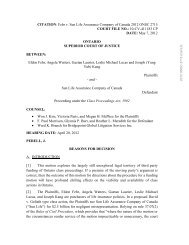
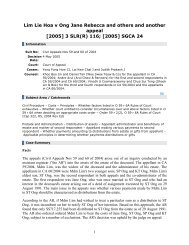
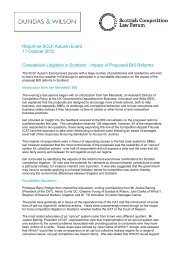
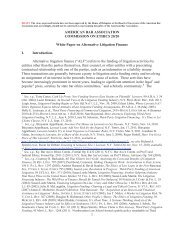

![Hall v Poolman [2009] - Harbour Litigation Funding](https://img.yumpu.com/37488843/1/190x245/hall-v-poolman-2009-harbour-litigation-funding.jpg?quality=85)
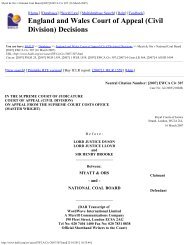

![[2013] SGHC 135 - Singapore Law Watch](https://img.yumpu.com/37488807/1/184x260/2013-sghc-135-singapore-law-watch.jpg?quality=85)
